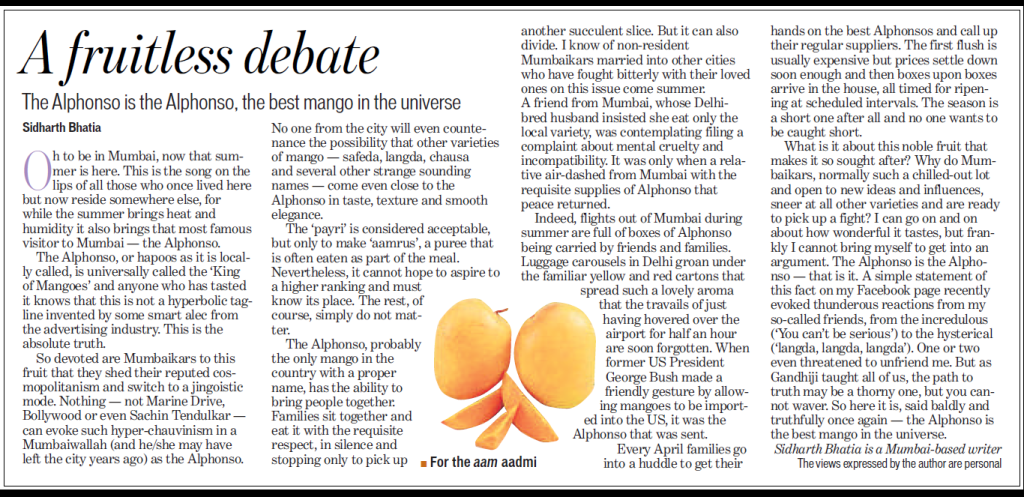Alphonso is grown in Devgad and our relation with Alphonso is the same as of a mother with her child! While Alphonso will always be closest to our hearts, we were pleased to read a writer’s perspective on it. Reproducing it for here in the service of our patrons!
_____________________________________________
Oh to be in Mumbai, now that summer is here. This is the song on the lips of all those who once lived here but now reside somewhere else, for while the summer brings heat and humidity it also brings that most famous visitor to Mumbai — the Alphonso. The Alphonso, or hapus as it is locally called, is universally called the ‘King of Mangoes’ and anyone who has tasted it knows that this is not a hyperbolic tag-line invented by some smart alec from the advertising industry. This is the absolute truth.

So devoted are Mumbaikars to this fruit that they shed their reputed cosmopolitanism and switch to a jingoistic mode. Nothing — not Marine Drive, Bollywood or even Sachin Tendulkar — can evoke such hyper-chauvinism in a Mumbaiwallah (and he/she may have left the city years ago) as the Alphonso.
No one from the city will even countenance the possibility that other varieties of mango — safeda, langda, chausa, and several other strange-sounding names — come even close to the Alphonso in taste, texture and smooth elegance.
The ‘payri’ is considered acceptable, but only to make ‘aamrus’, a puree that is often eaten as part of the meal. Nevertheless, it cannot hope to aspire to a higher ranking and must know its place. The rest, of course, simply do not matter.
The Alphonso, probably the only mango in the country with a proper name, has the ability to bring people together. Families sit together and eat it with the requisite respect, in silence and stopping only to pick up another succulent slice. But it can also divide. I know of non-resident Mumbaikars married into other cities who have fought bitterly with their loved ones on this issue come summer.
A friend from Mumbai, whose Delhi-bred husband insisted she eat only the local variety, was contemplating filing a complaint about mental cruelty and incompatibility. It was only when a relative air-dashed from Mumbai with the requisite supplies of Alphonso that peace returned.
Indeed, flights out of Mumbai during summer are full of boxes of Alphonso being carried by friends and families. Luggage carousels in Delhi groan under the familiar yellow and red cartons that spread such a lovely aroma that the travails of just having hovered over the airport for half an hour are soon forgotten.
When former US President George Bush made a friendly gesture by allowing mangoes to be imported into the US, it was the Alphonso that was sent.
Every April families go into a huddle to get their hands on the best Alphonso’s and call up their regular suppliers. The first flush is usually expensive but prices settle down soon enough and then boxes upon boxes arrive in the house, all timed for ripening at scheduled intervals.
The season is a short one after all and no one wants to be caught short.
What is it about this noble fruit that makes it so sought after? Why do Mumbaikars, normally such a chilled-out lot and open to new ideas and influences, sneer at all other varieties and are ready to pick up a fight? I can go on and on about how wonderful it tastes, but frankly, I cannot bring myself to get into an argument.
The Alphonso is the Alphonso — that is it.
A simple statement of this fact on my Facebook page recently evoked thunderous reactions from my so-called friends, from the incredulous (‘You can’t be serious’) to the hysterical (‘langda, langda, langda’). One or two even threatened to unfriend me. But as Gandhiji taught all of us, the path to truth may be a thorny one, but you cannot waver.
So here it is, said baldly and truthfully once again — the Alphonso is the best mango in the universe.
(Sidharth Bhatia is a Mumbai-based writer. The views expressed by the author are personal)
____________________________________________________________________
Published in Hindustan Times on Friday April 22, 2011
